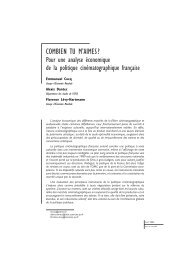N° 2005-09 Juin 2005 Guillaume Daudin* Jean-Luc Gaffard ...
N° 2005-09 Juin 2005 Guillaume Daudin* Jean-Luc Gaffard ...
N° 2005-09 Juin 2005 Guillaume Daudin* Jean-Luc Gaffard ...
You also want an ePaper? Increase the reach of your titles
YUMPU automatically turns print PDFs into web optimized ePapers that Google loves.
Relocation: What Matters? Competition or/and a New Policy MixAs for the cost-oriented competitive policy, it seems difficult if not impossible tocompensate huge wages’ differentials. On the other hand, any policy that consists incompensating wages differential by reducing non-wage costs thanks to infrastructurespending, fiscal reductions, or subsidies may favour the attractiveness of territories, but alsomake unstable localisation choices by decreasing exit (relocation) costs: if there is no specificadvantage for a firm to be located in one area or another, then the absence of sunk costsmakes location easily contestable.As for R&D oriented competitive policy, it is worth mentioning that vertical (orquality) differentiation of products, as a pure firm’s supply strategy, is not necessarily asolution insofar as successful emergent economies are engaged in a growth strategy thatconsists in being at the frontier of productivity gains. As Samuelson (2004) pointed out, hugeproductivity gains at the benefit of under developed countries in the production of goods forwhich developed countries had previously a competitive advantage are harmful for the latter.It is well documented that openness appears as a necessary condition for a backward economyto capture the (external) demand that makes it possible to produce the mix of goods allowinga higher potential of learning (i.e., a higher productivity growth), and thus to catch up with themost advanced countries. In fact, the backward economy, in order to maximise its growth rateof productivity needs to face a wide gap between the mix of goods produced and the mixconsumed, and this makes unavoidable international trade (<strong>Luc</strong>as 1993). Of course, allcountries may benefit from the enlargement of international trade, which is not a zero sumgame by assumption. But this depends on what happens on the demand side. Firms ofadvanced countries will really be in the position of developing new technologies and newproducts if internal as well as external markets are large enough, that is, in particular, ifunemployment does not increase.Competitiveness policies are sometimes presented as relevant with respect to theprevalent changes in the institutional environment. Transition from a multinational markethighly influenced by regulated exchanges among nations to a global market regulated byinternational trade and investment agreements would be quite a structural shock that wouldchange the nature of regional barriers to trade. In this new institutional context, due to sharpdecreases in transportation costs, which tend to zero in the case of immaterial value-addedactivities, production areas are disconnected from the market they are designed for. Thus localmarkets (in fact, population differential) would be no longer of importance in thedetermination of firms’ location, in fact in a limited number of activities. Minimisation ofproduction costs would be much more important than market proximity. Indeed, reference to67








